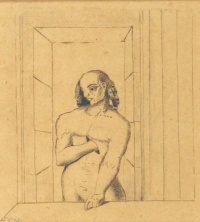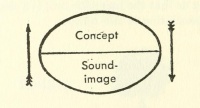Meaning
From The Art and Popular Culture Encyclopedia
(Difference between revisions)
| Revision as of 23:02, 22 December 2013 Jahsonic (Talk | contribs) ← Previous diff |
Revision as of 09:25, 20 April 2014 Jahsonic (Talk | contribs) Next diff → |
||
| Line 5: | Line 5: | ||
| [[Image:The Heart Has Its Reasons by Odilon Redon.jpg |thumb|right|200px|''[[The heart has its reasons, of which reason knows nothing]]'' (c.[[1887]]) by [[Odilon Redon]], a phrase from the ''[[Pensées]]'' ([[1669]]) by [[Blaise Pascal]]]][[Image:Sign and signifier as imagined by de Saussure.jpg|thumb|right|200px|[[Signified]] ([[concept]]) and [[signifier]] ([[sound-image]]) as imagined by [[Ferdinand de Saussure|de Saussure]]]] | [[Image:The Heart Has Its Reasons by Odilon Redon.jpg |thumb|right|200px|''[[The heart has its reasons, of which reason knows nothing]]'' (c.[[1887]]) by [[Odilon Redon]], a phrase from the ''[[Pensées]]'' ([[1669]]) by [[Blaise Pascal]]]][[Image:Sign and signifier as imagined by de Saussure.jpg|thumb|right|200px|[[Signified]] ([[concept]]) and [[signifier]] ([[sound-image]]) as imagined by [[Ferdinand de Saussure|de Saussure]]]] | ||
| [[Image:The-bouba-kiki-effect.png|thumb|right|200px|The [[Bouba/kiki effect]] (1929)]] | [[Image:The-bouba-kiki-effect.png|thumb|right|200px|The [[Bouba/kiki effect]] (1929)]] | ||
| + | [[Image:Véritable portrait de Monsieur Ubu, par Alfred Jarry (1896).png|thumb|right|200px| | ||
| + | This page '''{{PAGENAME}}''' is part of the ''[[communication]]'' series.<br> <small>Illustration: ''[[True Portrait of Monsieur Ubu]]'' (1896), a woodcut frontispiece for ''[[Ubu Roi]]'' representing [[Ubu]], a fictional character from Jarry's eponymous play. </small>]] | ||
| {{Template}} | {{Template}} | ||
| '''Meaning''' refers to the the symbolic [[value]] of [[something]], its significance. In semantics it refers to the [[object]]s or [[concept]] that a [[word]] or [[phrase]] [[denote]]s, or that which a sentence says. | '''Meaning''' refers to the the symbolic [[value]] of [[something]], its significance. In semantics it refers to the [[object]]s or [[concept]] that a [[word]] or [[phrase]] [[denote]]s, or that which a sentence says. | ||
Revision as of 09:25, 20 April 2014

Ars Memoriae: The Theatre (1619) - Robert Fludd
“In the illusory babels of language, an artist might advance specifically to get lost, and to intoxicate himself in dizzying syntaxes, seeking odd intersections of meaning, strange corridors of history, unexpected echoes, unknown humors, or voids of knowledge… but this quest is risky, full of bottomless fictions and endless architectures and counter-architectures… at the end, if there is an end, are perhaps only meaningless reverberations.” --Robert Smithson
“In the illusory babels of language, an artist might advance specifically to get lost, and to intoxicate himself in dizzying syntaxes, seeking odd intersections of meaning, strange corridors of history, unexpected echoes, unknown humors, or voids of knowledge… but this quest is risky, full of bottomless fictions and endless architectures and counter-architectures… at the end, if there is an end, are perhaps only meaningless reverberations.” --Robert Smithson

The heart has its reasons, of which reason knows nothing (c.1887) by Odilon Redon, a phrase from the Pensées (1669) by Blaise Pascal

The Bouba/kiki effect (1929)
.png)
This page Meaning is part of the communication series.
Illustration: True Portrait of Monsieur Ubu (1896), a woodcut frontispiece for Ubu Roi representing Ubu, a fictional character from Jarry's eponymous play.
Illustration: True Portrait of Monsieur Ubu (1896), a woodcut frontispiece for Ubu Roi representing Ubu, a fictional character from Jarry's eponymous play.
|
Related e |
|
Featured: |
Meaning refers to the the symbolic value of something, its significance. In semantics it refers to the objects or concept that a word or phrase denotes, or that which a sentence says.
Meaning may refer to:
- Meaning (linguistics), which is communicated through the use of languages
- Meaning (semiotics) has to do with the distribution of signs in sign relations
- Meaning as a relationship between ontology and truth
- Meaning as a reference or equivalence
- Meaning (philosophy of language)
- Meaning (psychology)
- Meaning as values, a value system or as derived from value theory
- Meaning (existential), as it is understood in contemporary existentialism
- The meaning of life, a notion concerning the nature of human existence
Contents |
Titles
- Laughter: An Essay on the Meaning of the Comic (1911) by Henri Bergson
- Subculture: The Meaning of Style (1979) by Dick Hebdige
- Taste: The Secret Meaning of Things (1991) by Stephen Bayley
Etymology
From Middle English mening, menyng, equivalent to mean + -ing. Cognate with Scots mening (“intent, purpose, sense, meaning”), West Frisian miening (“opinion, mind”), Dutch mening (“view, opinion, judgement”), German Meinung (“opinion, view, mind, idea”), Danish and Swedish mening (“meaning, sense, sentence, opinion”), Icelandic meining (“meaning”).
Citations
- 'The question is,’ said Alice, ‘whether you can make words mean so many different things'
- "Words: Can't say what they mean don't mean what they say" --Tom Tom Club
See also
- Absurdity
- Ambiguity
- Context
- Communication
- Connotation
- Definition
- Denotation
- Dictum
- Dictionary
- Double entendre
- Hermeneutics
- Intention
- Interpretation
- Language
- Linguistics
- Logotherapy
- Man's Search for Meaning (1946) by Viktor Frankl
- Meaninglessness
- Meme
- Metaphor
- Nonsense
- Opinion
- Philosophers encroaching on the province of grammarians
- Polysemy
- Purpose
- Semantics
- Sententiae
- Significance
- Symbolism
- Thesaurus
- Trope
- Utterance
- Where Do We Come From? What Are We? Where Are We Going?, a painting by Paul Gauguin
Unless indicated otherwise, the text in this article is either based on Wikipedia article "Meaning" or another language Wikipedia page thereof used under the terms of the GNU Free Documentation License; or on research by Jahsonic and friends. See Art and Popular Culture's copyright notice.


